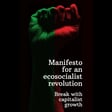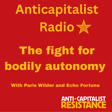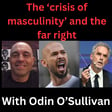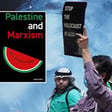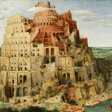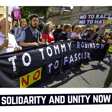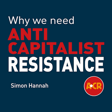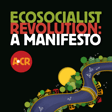Become a Creator today!Start creating today - Share your story with the world!
Start for free
00:00:00
00:00:01

Episode 18: The Ghost Limb - author discussion
A new Irish republic is possible – and some of its most passionate supporters are from Protestant backgrounds, breaking with sectarianism and tribalism.
A discussion with Claire Mitchell, author of the Ghost Limb (2022) and Stephen Baker a socialist and trade unionist from County Down exploring the shifting views on national identity, and asking what does it mean to be English if the United Kingdom ends?
Transcript
Introduction and Clare's Book 'Go Slim'
00:00:00
Speaker
Hello everyone, welcome to this discussion tonight, which is mainly about the book Go Slim and issues which it raises. Now, and we've got two speakers tonight, Clare Mitchell and Stephen Baker, both of whom come from ah Protestant background in the north of Ireland.
00:00:20
Speaker
And I myself, I'm a Dubliner from the other tradition. um And Clare is going to speak about her book first. And it deals predominantly with the 1798 rebellion, which is a seminal point in Irish history.
00:00:37
Speaker
And one of the things I always quote to people is that more people actually died in the 1798 rebellion than the entire French Revolution. So um an anecdote comes to mind that when I went two years ago on a walking tour of Belfast, um and the person bringing us around asked us, so were we aware of the fact that most of the people taking part in the 1798 rebellion in the North were Protestant, and people had no idea of that.
00:01:08
Speaker
And I think that's the general view outside Ireland. And there were people on the walk actually from the North of Ireland who weren't aware of it either because it had never been raised in the education system in which they were brought up.
00:01:23
Speaker
So for a lot of people, it's a very unknown, aspect of Irish history, but a very important one. And
Radical Protestants and Irish History
00:01:30
Speaker
Clare's going to talk about how that carries over into attitudes today towards United Ireland and so on.
00:01:37
Speaker
And then I'm going to bring in Stephen, who is a socialist and trade unionist from County Down in the north of Ireland, who is also going to talk about the history of that period and its impact on today and how both of them see all of this affecting ah the campaign for unit United at Ireland and reunification.
00:02:00
Speaker
Okay, so i over to you, Clare. Well, to you, Dave, I heard you. Thank you very much for having us here tonight. It's really brilliant to have the opportunity to meet you all and hopefully to chat later.
00:02:13
Speaker
and The title we gave is A New Irish Republic is Possible. So I think what Steve and I are here to say is that A second republic in Ireland is possible.
00:02:25
Speaker
It's not inevitable. It is urgent and necessary. And that is also really deeply connected to um wider struggles against capitalism and fascism in the UK, as well as on the island of Ireland. So it's brilliant um for us to be able to get a chance to talk to people outside this island and maybe compare notes in the discussion.
00:02:49
Speaker
I'll get into it by um starting to talk about the Go Slim, Alternative Protestants in the Spirit of 1798, which is a book I brought out I don't know, two or three years ago now.
Brexit and Irish Reunification
00:03:00
Speaker
And it's basically a book about Protestants who aren't unionists or loyalists. It's a lot of radical Protestants, leftists, people who are continuing on that 1798 kind of tradition, which was an anti-sectarian tradition.
00:03:16
Speaker
civic democratic movement basically and we're usually very excluded from discussions and analysis about the north and people just assume like um Joseph was saying that people didn't know Protestants were involved in 1798 the same goes for today people don't know that Protestants are kind of up to their eyes in the current struggle for Irish reunification.
00:03:40
Speaker
I wrote the book after Brexit, and which was really like for us in the North, a moment of deep powerlessness. Never forget watching the House of Commons debates on the laptop.
00:03:56
Speaker
and people in English, in England, were talking about the need to take back control. And sitting here in Newtonard, it's a small town in County Down, going, oh my God, like we've never had less control over our own political futures.
00:04:12
Speaker
than now. So that was really the catalyst for writing the book, that sense of democratic powerlessness. And of course, while not being a great big fan of the European Union, those of us who live in the North could see the impact it was going to have on our kind of fragile peace before it happened. And so it came to pass.
00:04:34
Speaker
And um yeah, the North was a tinderbox after Brexit. And debates about Irish reunification were the kind of obvious thing that would come out of that. So I wrote the book because could see Irish unity kind of coming the tracks.
00:04:53
Speaker
And I thought that people, especially in my community, the Protestant community, were not remotely psychologically prepared for it. And I'd been writing about politics with a big P before, and that had resulted basically in a lot of threats and being told to shut up.
00:05:10
Speaker
So I was like, how do you write into this kind of urgent political moment in a way that will land with with unionists, maybe with loyalists, with people from Protestant backgrounds who are curious about unity, who don't want to be dragged through the feelings of guilt and shame about plantation, but who just want to look for a progressive future.
00:05:34
Speaker
And yeah, the book tells the stories of about 20 Protestants, people from our background who who aren't genius. And um they're really diverse stories.
00:05:47
Speaker
They are stories of journey, I guess. Some of us are coming out of that tradition into a different tradition.
Cultural Identity and Language
00:05:54
Speaker
Some of us have never been part of unionism. But I wanted to tell stories that would allow other Protestants to see alternatives and to give people an escape hatch or different ways to kind of conceptualize and their lives and their families.
00:06:13
Speaker
I also wanted to tell the stories in the book so that Republicans would hear it in the Irish sense so that we could kind of shoehorn our way into the unity debate because I felt that we had something to offer that.
00:06:27
Speaker
The title, The Ghost Limb, um is my way of trying to describe how it felt like Steve and I both live in a wee town called Newton Arts and it is incredibly loyalist um you guys are taking up the trend recently with the flags and and the lampposts and painting your curb stones and so we've grown up with this as our backdrop, our whole lives.
00:06:55
Speaker
And like my upbringing was Protestant, but it was as a leftist Protestant. My parents, we always had Irish passports. They were big into anti-apartheid politics in the South African context at the time, now in Gaza.
00:07:12
Speaker
We grew up in a church that was really radical, radically anti-sectarian. They are Quakers now. So like I've always had the kind of different politics have always supported reunification but in the town where we live it's not really been very safe to talk about things like that and the ghost limb is my way of trying to describe how it feels to live here with like a part of you cut off you know ah part of you that you can't express
00:07:42
Speaker
And I think probably a good way to describe it is like what we would usually be doing on a Monday evening would be um to be in our secret Irish language class in the town.
00:07:54
Speaker
And we have it in the pub. um It's a class that we can't advertise. It's just um various friends that we've got out word of mouth. And I never forget um our friend Will, who's our teacher.
00:08:08
Speaker
and in the first couple of weeks, like learning a bar order, like what you would go and order if you were to get a drink, but while I'm jock. um And then I'll still turn around going, oh, but can we actually go and order at the bar? And the barman, Connor, was in the class and he'd no, we'd appreciate it if you didn't do that.
00:08:25
Speaker
Or just make sure you see how many people are here or not. And, you know, if it looks safe, can we give you the nod? So that's how it feels to kind of live here, you know, kind of hiding, know, parts of yourself and parts of your identity.
00:08:38
Speaker
I guess if I'd been giving this talk maybe three years ago would have said that might be hard to relate to when living in England but I suppose with the current climate that we're all living in now maybe that is something that is more relatable to sadly.
00:08:56
Speaker
So anyway the go slim feeling And I thought that was just me, that I was the only weirdo in the village who felt that they had a missing limb. But as I began to talk to other kind of friends, I realized that a lot of us were kind of walking around with that dissonance.
00:09:14
Speaker
We didn't really have like a role in the debate. You know, we were kind of Protestants, kind of Republicans, kind of otherish. We didn't really fit anywhere. And um we had a story that that wasn't often told.
00:09:27
Speaker
and I guess COVID happened and we're all locked down and like you got locked down in London or Bristol or Nottingham or wherever you are, but we got locked down in Newtonards and it's a really beautiful part of County Down and that was great. But, um,
00:09:47
Speaker
It also kind of made me confront the idea that I got to stay here. Like i can't afford to move. I've got to live in this red, white and blue landscape and I can't suppress myself and my voice and be meeting in secret rooms for the rest of my life. and So I really wanted to to speak to that, to say something about it.
00:10:10
Speaker
And um teamed up with about 20 friends and people that are known to me. And I'd been given a book around this time about the sites of the 1798 Rising Zantram and Downe.
00:10:24
Speaker
kindantrum and dine And it turns out that this kind of loyalist town where we live was epicentre of the rebellion in 1798.
00:10:36
Speaker
And that was basically the first goal at declaring Irish freedom and independence. The United Irishmen were the group behind it. They were an anti-sectarian movement um inspired by the kind of French Revolution model and what was happening in America at the time, Scottish Enlightenment thinkers.
00:10:53
Speaker
And yeah, they actually declared our little loyalist town for the Irish Republic for three days in 1798. And so my mind was totally blown away.
00:11:05
Speaker
finding out about this, that there, not just, it wasn't just me, the only person, the only radical in the village, but there had been ah huge tradition here, stemming back hundreds of years, that people had kind of forgotten or um it had been shoved out of view because it didn't kind of fit into the binary politics we have now.
Protestant Perspectives on Unity
00:11:29
Speaker
So I worked out that a lot of my friends were feeling the same way and we started to visit sites of the 98 rebellion and just talk about our feelings of like our lack of democratic power, what was happening on the island, and our feelings after Brexit, about capitalism in the world and in general and the book is full of um joseph alluded to the 1798 scene which is really vibrant in the north the tours walking tours cafes events music events festivals so there's a lot of people really actively exploring in that history um usually or very often catholics and protestants doing that together so that's a very kind of
00:12:16
Speaker
buzzy and exciting place where these ideas are to be found in the present. also spent a lot of time in the Irish language movement um and people who spoke Ulster Scots as well.
00:12:28
Speaker
Weirdly in the churches, which I didn't think was a place I was going to find radical thinking. But um I guess with all the Quakers being arrested now with the the Palestine solidarity movement, I guess that's not surprising because we're seeing that.
00:12:46
Speaker
across the UK and then the book is full of activists as well, kind of um environmentalists, feminists, trade unionists like Steve, queers, pans and the trans, all kinds of people from Protestant backgrounds who were looking for a different way to like understand their role on the island.
00:13:06
Speaker
In the book about half of the people full on wanted Irish unity yesterday, please. The other half are kind of just more open-minded and curious and open to it.
00:13:18
Speaker
and We are not a mass movement, um kind of unity prods in the north of Ireland. Amongst people who identify as Protestant in general, about 10% of them, 9 or 10%, say they would vote for unity tomorrow, which is actually higher than I expected.
00:13:36
Speaker
A lot of people in kind of our situation would identify as other, neither, sort of not Catholic or Protestant. And about 30% of those people would um choose unity tomorrow. um But I think, while those are low enough numbers, what the figures don't tell us is that there is a huge kind of unhappiness with the north of Ireland, the way it is with the democratic deficit here.
00:14:04
Speaker
And that really there's a lot of people who are curious about what this political moment means for the constitutional politics. and on the island of Ireland and that um yeah are definitely open to exploring it and I'd hoped in the book that we could kind of bridge across um to the kind of mainstream discussion as well amongst nationalists and republicans about Irish unity the book has been on quite an afterlife if it came out
00:14:38
Speaker
say three years ago. I'd say the ideas have come on a lot since then. in the book you could see us all kind of doing like a little dance with the word republicanism and whether or not we saw ourselves as republicans because in a way that was like crossing over to the other side of the communal divide like most of us in the book have various experiences, direct experiences of the conflict and so on. By the time the book came out, shortly after I was speaking at the Sinn Féin Ardèche and doing events with Ireland's Future, which is a big kind of civic movement on the island calling for Irish unity.
00:15:21
Speaker
So what we find it was kind of like a rapid kind of snowballing movement afterwards, and that it was really quite liberating and for ourselves and kind of catalyzed relationships with communities that we would have not been estranged from, but wouldn't really have had many bridges over to beforehand, before that.
00:15:45
Speaker
If I'm looking at it in 2025, the situation i think feels kind of even more urgent than it did in the post Brexit moment, because I'm sure Farage reform, everything that's happening in the mainland of the UK at the minute, feels pretty nauseating for us.
00:16:09
Speaker
and the eye on the island of Ireland, in the north of Ireland, we're just kind of caught up in the coattails of it. Do you know, because whatever happens with a with England and with English nationalism, we can vote for whoever we want to vote for, but it'll have absolutely no difference to the government of England.
Challenges in the Irish Unity Movement
00:16:30
Speaker
and we don't know if we're going to be it's going to be decided in the future that we're an important military or economic asset or if we'll be kicked to the curb so it's very kind of uncertain and then that kind of infection from of right far right politics from America and then coming through England is manifesting on our streets as well it kind of layers up on top of our kind of traditional sectarian divide and loyalist communities have taken to it with great um enthusiasm. Of course, not all loyalists. We have loads of friends here, loyalists and socialists and anti-capitalist loyalists, but and it has been you're received with great enthusiasm. And we also have our kind of far right entrepreneur kind of media empires trying to set up here and kind of
00:17:27
Speaker
um co-opt the unity conversation into that new kind of culture war divide. A lot of us, and Steve and I have sort of taken steps since the book to actively explore what's going on in the Irish unity movement to see um what was going on there in terms of people maybe coming from an eco socialist perspective.
00:17:55
Speaker
We knew that we we were gonna have a lot of shared values, you know, cause like we're Irish, we want a politics that's decolonial, that's antisectarian. We know that we don't want monarchy, that we want a citizens' republic.
00:18:08
Speaker
and And so and in theory, there's a lot of kind of shared ground and shared values that we could work with. The praxis of that is a bit more complicated.
00:18:21
Speaker
The Republic of Ireland, as many of you know, is a pretty neoliberal state. It is kind of a tax haven. It relies very heavily on the American empire for pharmaceutical and technology jobs.
00:18:37
Speaker
It has really big structural problems with housing and health care and so on. So like unlike the Scottish independence movement, where people of the left could kind of gather together and say, like, this is what independence means to us. and you could dream up a new project together.
00:18:54
Speaker
In the north, we're kind of looking at this very flawed Republic of Ireland going, how could people with our values um join with this and shape it to something that James Connolly would have been a bit happier with. and That said, there is a stronger culture of solidarity in Ireland. The quality of the civic dialogue is a lot better.
00:19:20
Speaker
They are talking about things like the rights of nature. We've seen them be a lot better about Gaza and Palestine. So for me, and it's still kind of obvious that unity would be a better position but that is not without kind of great struggles for people of our politics.
00:19:44
Speaker
What we find in the unity movement itself was it too was quite neoliberal. um It was kind of civic society, the great and good, kind of negotiating the case for unity via spreadsheets of what would happen with economic growth and GDP and making arguments about foreign direct investment money.
00:20:07
Speaker
Other arguments like it were a sectarian headcount, the Catholics are going to outbreed the Protestants any day soon. And it sort of accidentally steer in like spilling over into that kind of ethno-nationalist territory.
00:20:21
Speaker
And as far as Protestants were concerned, the debate that as we find it a couple of years ago seemed kind of just to be about tokenism and symbolism. Protestants will need a flag, and maybe they need an anthem, maybe we'll need to give up Irish neutrality, you know, and join the Commonwealth, things like this.
00:20:40
Speaker
So we kind of have spent the last number of years trying to shoehorn ourselves into that debate and to try and find kind of our allies. amongst nationalists and republicans and people in those political parties because what we want to talk about with regards to that debate is not really about being protestants although we think it's really important that people who are British have rights to British citizenship and that various cultural rights are protected but what we want to talk about is food, water, energy
00:21:12
Speaker
you know how we can use our independence in creative ways so that people can living in a just and sustainable society we want to try and wind up there yes absolutely we want to talk about rights not just for protestants but migrants and queer and trans rights we want to kind of take the lessons from the Scottish independence referendum and ask what could we be that's better as an independent Ireland.
00:21:40
Speaker
So we've concluded that the North can't work. and are It was never kind of a moral or just settlement. Now it's in tatters. It's a failed state. like You wouldn't believe the levels of political dysfunction um over here.
00:21:56
Speaker
And yeah we need our friends and comrades in the UK, and Scotland, Wales, England, and across Ireland kind of help us work out how we can almost extricate ourselves from this sense of democratic powerlessness collectively.
00:22:13
Speaker
So, Sinead, that's it for me. Thank you, Claire. A lot of interesting points there. um What you mentioned about the... um ah car sides being painted red, white and blue. I saw one of the commentators on Newsnight recently talking about the ulsterisation of British politics over the flag flying. So what you said there is very, very
Steve Baker's Identity Journey
00:22:40
Speaker
relevant now. You can always identify in the north which areas you're entering by which flags are flying and which colours are painted on the curb.
00:22:50
Speaker
So i wanted to welcome Steve now. um also from County Down, um say a few words. Steve. like Thanks, Joseph. And listen, thanks everyone for having us along.
00:23:02
Speaker
having us a along um We really appreciate this because ah as as Claire said at the end there, I think this is this is a really important conversation and it's one that goes um beyond, um as has already been suggested, just be but goes beyond Ireland.
00:23:18
Speaker
um Because and as someone who's who' lived and worked for a while in England also and pays very close attention to politics across the UK, It seems to me that we're all in a sense kind of trapped um in this miserable, undemocratic, archaic state.
00:23:38
Speaker
And it's not just Ireland that needs free of it. You know Scotland's already made a bid for freedom at one point. Wales at some stage ah may do it also. But also I think England needs to be free of Britain also. And in some respects, I think what you're sort of seeing in the UK at the moment or in England particular at the moment,
00:23:56
Speaker
is a kind of warped example of the the the urge towards that. So what ah but what I want to do here really is I want to, um I'm from ah I'm from ah quite a traditional um working class, Northern Protestant background. My dad was a lorry driver and my mum was ah a factory worker.
00:24:18
Speaker
um So I'm a bit surprised to find myself, you know, at the grand old age of 57 years old on ah on a Zoom call, um talking about how I become a sort of a full fat Irish Republican, you know, having been the sort of semi-skimmed version for most of my life.
00:24:35
Speaker
um And, you know, ah one of the things about being one of the correspondents in Claire's books, there's a chapter that that Claire interviewed me for. And ah one of the things about that was, and I'm very grateful to Claire for this, was that um it was a kind of release.
00:24:53
Speaker
You know, it was like being released from what up until that point had been a sort of an intellectual and political prison that I found myself in, you know, where where I wouldn't allow myself to sort of think particular things because I didn't know how to explain it to myself and I didn't think I would be able to explain and the po the political conclusions that I was reaching to any of my friends or neighbours or family.
00:25:13
Speaker
um So Clare's book arrives at a really kind of um interesting moment it's during COVID and Claire phones me and says look um ah would you come and be interviewed for the book that I'm doing I want to base a chapter on you so we ended up walking on and a golf course just close by here that was closed during COVID so it was empty it's a lovely place the golf courses are lovely places They're so well looked after and manicured.
00:25:41
Speaker
Lovely place to go and walk and walking about with a microphone on and just all this stuff come out. Stuff I hadn't talked about before because one, I wouldn't have felt safe if um to do it. And as i sort of say, I felt kind of ideologically and politically imprisoned, in many respects a prison of my ah my own making. But it all come out during Covid and once it's said, it can't be unsaid. And once it's in print, it can't be unsaid. So you kind of then sort of in for a penny, in for a pound.
00:26:08
Speaker
I've got to sort of say, as I come from the background that that i that I did come from Ulster Protestant working class background, I never knew very much about the Republic of Ireland and knew very little about its politics and its history, um less about its culture.
00:26:23
Speaker
um and and and But I knew I wasn't a unionist. you know And as I got older, um you know I became increasingly open to the idea of United Ireland, but I thought it was something that but just wasn't on the agenda, wasn't in on the horizon, and something that we wouldn't see and and certainly in my lifetime.
00:26:40
Speaker
And by the time we got to sort of something like the Good Friday Agreement, I kind of welcomed that as a settlement. you know Anything that was going to bring peace, I thought was going to be a good thing. um and um I just thought that, you know, well while it wouldn't be the end of history, the Good Friday Agreement, that certainly the duration of the rest of my life, that this would be the settlement under which I would live. And I welcomed it also because it was an opportunity, I thought, to sort of set aside the kind of constitutional questions which had dogged politics here for so long, that dominated the political conversation.
00:27:12
Speaker
and allows us a socialist and a trade unionist to begin to talk about issues to do with class, to do with social economic issues, to do with issues around gender and sexuality. And in some some respects, I think the Good Friday Agreement did that.
00:27:26
Speaker
It did create a bit of a space in which those sorts of conversations beyond unionism and nationalism were allowed to kind of flourish. And as I just say, I could have lived with that. I could have probably seen it the rest of my days with it.
00:27:39
Speaker
So what what changed? um I think the first thing that changes is the financial crash of 2007, 2008. That's that's kind of devastating. It's devastating everywhere, but it's devastating in a very particular way in the north of Ireland, because one of the the conditions of peace and the political settlement here was that we were to anticipate, we were told, a peace dividend.
00:28:03
Speaker
Now, the peace dividend basically meant that if Northern Ireland could be at peace, if it could ever go achieve some sort of political stability, the promise being made to us was that we would enjoy ah degree of political ah economic prosperity would come here, that which which had been absent beforehand.
00:28:17
Speaker
Money that had been spent on security could now be spent on public and ah and social services, you sort of um swords into plough shares kind of style.
00:28:28
Speaker
and that it would attract economic investment here. And we were all going to be better off because of that. Ten years after that promise is made on the sign of the Good Friday Agreement, we're in the austerity. Now, austerity is devastating everywhere. I think, you know, if you live in a region like the north of Ireland, which is already in pretty poor shape, austerity just makes things considerably worse.
Political Impacts of Brexit
00:28:49
Speaker
you know, um and also during austerity, the institutions which have been set up under the Good Friday Agreement keep collapsing. They're constantly unstable. um And one of the reasons for that instability is because unionism doesn't seem to have it within itself to make the necessary compromises to make this settlement kind of function. So you've got austerity, you've got um economic instability. like And then in the middle of that in 2014, you get the Scottish independence referendum.
00:29:17
Speaker
And just for a moment, you kind of see the excitement that there is in Scotland. You see also an awful lot of people who otherwise had given up in politics suddenly become reengaged. An awful lot of working in class communities in Scotland who perhaps that we didn't even bother to vote are suddenly excited about politics again and because there seems to be the opportunity to vote for something which is actually going to come up with some kind of tangible change.
00:29:39
Speaker
And the offer that's being made by the by by the independence movement is a is a more left of centre, more social democratic vision of Scotland that outside the UK than exists within it.
00:29:56
Speaker
And i got be I was excited about that. I mean, it looked all of a sudden like there was a serious political to debate taking place of what the future might look for. Scottish independence referendum, of course, fails.
00:30:07
Speaker
um I think it's worth bearing in mind that I don't think the United Kingdom is a voluntary union as the Scots are finding out now. And in 2016, and you get Brexit, and Claire's already talked about this. Again, I'm not a Remainer at all. I could have easily been persuaded to vote to leave the EU, um especially after we' seen how Greece had been treated.
00:30:27
Speaker
um But the two reasons why I didn't vote to leave was because... I didn't think it would be in the interests of this little region that I live in to be taken out of the European Union by what looked to me like a coalition of English nativists and buccaneering free marketeers.
00:30:44
Speaker
That's just not going to work in a region like the north of Ireland. And the other thing, too, was that, you know, the Good Friday Agreement, the settlement that I thought I was going to live and die under,
00:30:55
Speaker
you know, depended upon an idea of the UK and Ireland as partners within the EU. It was a settlement that presupposed we lived in a world of relaxed notions of sovereignty and much more porous borders.
00:31:11
Speaker
And Brexit ah was an end to that. So for those two reasons, for the kind of political and reasons of ah not being let out by English nativists and free marketeers and just to protect the settlement that we had here.
00:31:24
Speaker
I didn't vote for Brexit. I don't mourn leaving the EU, got to be honest. But, you know, Brexit was an illustration, as Claire sort of said, of just how little um control ah people here have over um their destinies. So again, just another thing that makes me go, I don't know how much longer I can sort sustain my agnosticism about the constitutional question.
00:31:46
Speaker
I then watched the monstering of Jeremy Corbyn. There was an opportunity, it seemed to me, for the UK to take a very different political direction. um But it was closed. It was closed off. It was sabotaged by people within his own party.
00:31:58
Speaker
And it was very, very clear that, you know, the the British press and the lickspittles within the press moved against Corbyn and that that was that that was an option that was completely off the table. And what we got instead was the election of of off Boris Johnson.
00:32:11
Speaker
um And I can't even begin to explain to you the level of despair I felt on election night when that exit poll came out in 2019. I was actually driving from Newton Ard's over to a neighbouring town, Bangor, where the count was taking place to join a friend who'd stood in the elections and the um the exit poll came out.
00:32:31
Speaker
Now, living over here, we had no real idea what the mood was on the ground in England. But when heard the exit poll and it was a landslide to Johnson, I nearly put the car off the road. I arrived and I was just in despair.
00:32:43
Speaker
And they were talking about 10 years of Johnson. And, you know, the enormity of that sense of democratic impotence and democratic deficit, that was that was the moment that kind of kind of broke me. And then we're into COVID-19.
00:32:57
Speaker
um under a Johnson government and then Claire Mitchell phones you and says, come for a walk on the golf course, you know, and and tell me what you think. And I thought, right, I'll fucking tell you exactly what I think. I'm done with this.
00:33:10
Speaker
I can't be silent the about it any longer. You know, partition was an historic injustice. I never thought Irish unity was ever going to be inevitable. But that's it. I'm done.
00:33:20
Speaker
I'm not going to. The Northern Ireland doesn't work. the settlement doesn't work. The political instability doesn't work. um And people in England are quite entitled to vote for things that they want.
00:33:31
Speaker
But, you know, we have elections and we end up having we end up getting whatever people in England want. So that was sort of it over. The really interesting thing about taking part in the ghost limb and also the so stuff that's come subsequently was the opportunity, as I say, just to get out of that intellectual and political prison that I think I'd found
Reclaiming History and Identity
00:33:53
Speaker
myself. And I'm sure other people felt exactly the same.
00:33:56
Speaker
And to discover another history and heritage on this island, of which people like me were part of Macon, to discover that it gives you gives you a foundation here, but also the opportunity to imagine, to allow yourself to imagine something beyond the intellectual and political prison within which you find yourself, that things could be different.
00:34:18
Speaker
And also the possibility of inventing you know this new republic. And for those reasons, for those democratic reasons, I kind of found this idea kind of irresistible.
00:34:30
Speaker
And as I say, it's been it's it's been ah an interesting interesting journey for me because I am I'm an Anglophile in many ways. You know, as I said at the start, I grew up in a working class Protestant background. I don't know anything about the 26 counties on this island at all when I'm younger.
00:34:45
Speaker
I know nothing about it, but I do know um that my my all my favourite television dramatists are English. You know, it's people like Alan Blesdale and Willie Russell. My favourite authors are English.
00:34:56
Speaker
Stan Barstow, Alan Silito, John Brain, those novels. My favourite music is the jam and the Smiths and the Clash. You know, so all my cultural coordinates are are English.
00:35:08
Speaker
My favourite politician was Tony Benn. You know, I used to write letters to, you and he used to write back. God bless him as well. I still got them. And it was Tony Benn that introduced me to a kind of radical English history, um you know, the ladders and the diggers and the suffragettes and the chartists.
00:35:25
Speaker
um And so that that's the kind of tradition that I kind of came from.
00:35:31
Speaker
And I still love it, but it's gone. You know, the kind of social democratic, multicultural version of Britain, you know, that maybe I would have felt comfortable with it under the settlement. It's gone.
00:35:44
Speaker
Tom Devine, the Scottish historian, said something interesting because Tom Devine comes from a kind of Labour family in Scotland um and would always have been a kind of unionist. But at the time of the referendum, he said, um he said, I'm going to vote for independence.
00:35:58
Speaker
He says, I'm voting for independence, not because I want to leave Britain. but because Britain has left me. And he was talking about a particular social democratic version of Britain that has kind of gone.
00:36:08
Speaker
So it's gone. You know, there's nothing to hold me any longer here. um And as I say, that's of the reasons why I've sort of i've gone the sort of full fat Irish Republic. But you're trying to wind up now, Steve. Yeah, yeah.
00:36:20
Speaker
I want to ask a question just of yourselves when you've got an English audience here, but predominantly English audience, I assume. You've just had a summer of flags. um you know, put up everywhere, the kind of austerisation that we've sort of seen.
00:36:35
Speaker
Paul Goulding of Britain First was here a lot of years ago and stood in the street just down the road from where I live and made a wee video where he was effusive about all the flags he could see in wall murals.
00:36:46
Speaker
he said, isn't this fantastic to see such a patriotic community?
00:36:51
Speaker
entirely misinterpreted what those flags actually represent. They're representative of an identity crisis. And that's what I see at the moment when I look across at England as an identity crisis being played out in English politics by Farage and people like Tommy Robinson.
00:37:12
Speaker
People sort of say that that, you know, if we could just make the National Health Service better and improve the economy. You know, we can win people back from the right. I think that's partly true. But that old that' that sort of thing that Clinton always sort of said is the economy, stupid.
00:37:27
Speaker
That's ah that is an old neoliberal argument. It's not just the economy, stupid. England, like Ireland, I think needs a story to tell about itself, a good story to tell about itself.
00:37:39
Speaker
I think one of the things that we in the left need to do is to give people, because they need it as a cultural moral framework within which they can live their lives, they can work, they can love and they can die within.
00:37:52
Speaker
And so as people that me and Clare are kind of over here, kind of trying to put together a story and a narrative ah about what a new republic in Ireland might look like. find myself wondering, you know, is the same debate taking place in England?
00:38:07
Speaker
And is it a debate about English identity and what it means to be
Q&A: Identity and Sectarianism
00:38:12
Speaker
English? Because I worry sometimes when I look at what I see in England at the moment is that that conversation has been conceded by many people to the far right.
00:38:23
Speaker
I'll leave it there. Thank you.
00:38:27
Speaker
Thank you, Steve. Again, a lot to think about there.
00:38:34
Speaker
um So we're over to the Q&A. So if you can put your hand, electronic or otherwise.
00:38:46
Speaker
Chris? I was really intrigued by the last thing that you said there, Stephen. 30 years ago, when the Labour Party was becoming more visibly knackered in England and the Labour Party got rid of Clause 4, the so-called Socialist Clause the Labour Party, there were various movements developing or local groups developing, um which included the Scottish Socialist Movement, which became the Scottish Socialist Party in subsequent years.
00:39:18
Speaker
And I remember being at a meeting ah with the comrades down from Scotland. so I think it was in Birmingham. And they turned round to the English comrades present and say, look, you're really going to have to come to grips with being English.
00:39:34
Speaker
you're going to have to really work out what that means for socialists in England, because you have, to some extent, Plaid Cymru, and there was ah an organisation then called Cymru Gough, that was a Welsh nationalist organisation that we're developing there.
00:39:50
Speaker
And obviously there was what became the Scottish Socialist Party. And they understood, in the way that you have just said to us, that there is a real problem from coming from the core of empire.
00:40:01
Speaker
from England, from London, we've been at the centre of things for so long. And your identity in terms of a socialist or a working class person, a working class socialist,
00:40:12
Speaker
is so to resist and be hostile to any form of nationalism, that the idea of coming to groups being English and not just being a socialist or whatever was really, really difficult.
00:40:24
Speaker
And I think what you said has really brought that home to roost, and comrades have to address that question in in in coming, well, immediately, never mind coming anything. Thanks.
00:40:36
Speaker
I'm just going to take two or three questions together and then Claire and Steve can answer them. um So Terry.
00:40:48
Speaker
Thanks, Joseph. um Yeah. Okay. So i think the Scottish model, the model in Scotland is interesting because everybody who lives in Scotland has a purchase on the debate about what sort of Scotland we need.
00:41:13
Speaker
i don't identify as English. I identify as Irish. I'm third generation, but I grew up in a minority Catholic community in my area.
00:41:28
Speaker
So I grew up with the the stories of Ireland
00:41:36
Speaker
at my grand my grandparents' knee. And I think, so for me, the idea of an English identity, I'm not going to identify with the butcher's apron.
00:41:51
Speaker
I'm sorry. That's, and, you know, for the millions of people in Britain who've come as migrants, themselves or or historically, i think that's a real problem. I think living in an imperialist heartland, the question of identity is much more complicated, which isn't to say, and I just wanted to pick up on something that Clare said, because I think it's, it and actually you both said it, Stephen said it too, I think the destruction of the British state
00:42:30
Speaker
is is a liberation for everybody living on these islands because it's a prison house. um and And it's also true that the 26 counties is a prison house. i I was thinking about it when you were talking about the impact of the Good Friday Agreement and I was wondering if we would have won the constitutional amendment, if we would have won gay marriage if if if the Good Friday Agreement hadn't happened. And I think that wouldn't have happened. I think the end of the the the troubles in the in the in the shape they were gave gave space for those other politics to come through, which isn't to say that people hadn't been organising around those questions for decades before.
00:43:25
Speaker
um And I guess...
00:43:29
Speaker
i I guess the other question i would like to ask, certainly on the media here, it's been suggested that the stats in terms of support for an um for for a United Ireland are much higher amongst young people than they are amongst older people. And I'm just curious to know if that's your experience too.
00:43:54
Speaker
Thanks. Thanks, Terry. ah Bob? ah Okay, want to throw in a number of things.
00:44:16
Speaker
English. I'm a second generation Scot. If you look up my name,
00:44:29
Speaker
I was the honour of the Scottish President by cultural background.
00:44:40
Speaker
And that is something I want to raise first. That is often people talk about identity without defining what I mean by that.
Redefining Regional and Cultural Identities
00:45:00
Speaker
Is it identity in a geographic sense or is it about culture?
00:45:11
Speaker
And what is the cultures that we're talking about? Because in Scotland, we have got the divide of Catholic and Protestant And often when we talk about the Scottish independent movement, in my opinion, a lot of people forget about the Jacobean history.
00:45:58
Speaker
domination of Scotland in closing those kind of issues. And I am by saying this, that back in the day, used to have contact with members of People's Democracy, of a family, and the bridge
00:46:29
Speaker
and la ah again we u ice ah shall yeah you will four into that I was at a conference where it was discussing whether to develop or not and to enter into some things.
00:46:57
Speaker
And the reason I'm talking about people's democracy is the fact that its traditions were very different from the usual politics that you see in Ireland.
00:47:18
Speaker
And again, I think that is something we should lose sight of as well.
00:47:27
Speaker
Thank you, Bob. um So Claire, do you want to take up the questions first? I'm just really identifying so hard and with all your questioners. Thank you for those.
00:47:40
Speaker
What I'm really identifying with is like the ick of the identity, you know, and ah in your case, you're saying Englishness. And we had to get pushed through so many icks as well. You know, by the when I was writing the book, I didn't even think of myself as a Protestant. You know, that was an ick.
00:48:02
Speaker
I didn't want to end up being seen as part of and a nationalist movement because I'm an internationalist and that term was an ick for me as well.
00:48:15
Speaker
And I had discomfort, I don't know, the word Republican and Republicanism because I felt like I'd be being co-opted and into somebody else's kind of movement or identity.
00:48:27
Speaker
But I think what we find that but You have to be in it to change it. You know, if i if we had continued to opt out of everything, opt out of being Protestant, well then what could we do to change our situation? What we could do, which would be creative and possibly interesting, would be to take the term and subvert it to fill it up with our own content or else the ground would be completely ceded
00:49:02
Speaker
to others who claimed that protestant Protestantism is loyalism, it is unionism, it is conservative, it is right-wing.
00:49:13
Speaker
And so we found that we had to get our hands a little bit dirtier than um we wanted to there. and We find that We still don't identify as nationalists, but the kind of civic nationalist model is, and civic republican, I think is a word I would use almost more than Irish Republican because I too like don't like locating it too much within a regional or a specific kind group of grip ah peoplehood but Bob your question is it geography or is it culture and history that's such that gets to the heart of because there is a reality that has to be grappled with there and the reality is geography you know in a time of kind of ecocide and
00:50:05
Speaker
and war there are certain things that have to be organized practically on a geographical basis and um and maybe in England it's not a wider story of Englishness that needs to be told I just don't know i think the thing is leftists and radicals here are quite disconnect while i am quite disconnected from what's happening in England. Maybe the answer is further democratization of the regions. I don't know, but there is um there is a reality of geography there and maybe something creative, playful, subversive
00:50:46
Speaker
anarchic could be done with the idea of Englishness. We've talked about the diggers, the chartists, the suffragettes. There's so much good stuff there and ah ah about rejection of empire and colonialism and, you know, against domination that that could be reclaimed. um Yeah.
00:51:05
Speaker
So just some responses to that, the power of reclaiming and subverting other people's terms that people are going to be using them anyway.
00:51:18
Speaker
ah Steve? ah Yeah, I mean, those are really interesting comments um and questions. and let me say Let me say this here.
00:51:29
Speaker
um There's a ah ah guy called Francis Mulhern wrote an article I read a few years ago. in which he said that national questions are too important to be left to nationalists.
00:51:43
Speaker
um And I kind of agree with that. I'm squeamish about nationalism. In many respects, my nationalists, my my tendency in the past to sort of sit and just want to look at what we call bread and butter issues over here, the social and economic stuff and avoid the constitutional questions was precisely because I didn't want to become involved in what I've seen as kind of nationalist debates and they've kind of become unavoidable in a way.
00:52:08
Speaker
um So I think england has Ireland has a national question, Scotland has one, Wales has one, England has one as one as well and I think You know, those questions are too important to be left um to nationalists.
00:52:21
Speaker
I think the other thing for England is if Ireland goes and Scotland goes and maybe even Wales, which is probably more deeply colonised than Scotland and and Ireland are.
00:52:33
Speaker
But that butcher's apron begins to look very different because the saltar is gone. um the St Patrick's Cross is gone and you're left just with the Red Cross of St George on it.
00:52:46
Speaker
um And i understand entirely why, you know, Terry would sort of say, look, I'm actually of Irish descent here and I'm not too sure how i'm going to fit into England. um If you think about the the circle where Clare and I are at the moment, um Irish national identity has been historically defined, certainly since partition,
00:53:08
Speaker
as something which is rather conservative, Gaelic, Catholic and rural. um Clare and I fit into none of that. you know So when Clare and I look looks southwards and we see right wing politicians or right wing activists in the south,
00:53:26
Speaker
um you know ah abusing people of colour. The question we reflect upon for ourselves is, well, you know, what kind of bastard are you going be to us in and an event of unity?
00:53:39
Speaker
And that that brings a a degree of urgency to the kind of work that we do, because we want to offer a more inclusive version of Ireland um than the one that a Conservative Ireland might want to impose.
00:53:53
Speaker
And so there's a kind of urgency about about including ourselves as Claire says shoehorning ourselves in there and making ourselves um part of that of that story because the other thing too is of course you know um there are there are black Irish you know Phil Lynott Black athletes are competing for Ireland um and we have ah nobody in Ireland has any trouble at all about claiming them as Irish.
00:54:17
Speaker
But there is there is a question when you begin to talk about questions of identity, those issues about how inclusive they are. And certainly, you know, any... version of England in the future has got to be one which is more democratic and inclusive than what's being proposed on the streets of London at the moment at those demonstrations by um Tommy Robinson.
00:54:37
Speaker
The other thing I would say is this here, the people across this island, these islands, we're not strangers. You know, we are deeply involved in each other culturally and historically.
00:54:48
Speaker
One of my favourite television playwrights is Jimmy McGovern from an Irish Catholic background, living in Liverpool, but also so he describes himself as an English patriot and he's done a television drama about Bloody Sunday.
00:55:00
Speaker
um The Chartist movement, you know, I think it was the Northern Star newspaper that was set up. It was set up by an Irishman. It took its name from the United Irish newspaper, the Northern Star in Belfast.
00:55:12
Speaker
I think there was still a version of the Northern Star being published and produced um in Yorkshire up until the 1990s, perhaps.
Challenging Sectarianism and Brexit's Influence
00:55:20
Speaker
um You know, we look at the England football team over here, you know, and I can't believe how many of our Irish players you have poached.
00:55:29
Speaker
Grealish, Cain, Rice, I'm particularly better about quite frankly, you know, um you know, so there's a, you know we're not strangers to each other in that sort sense. And I think the thing which warps and makes so difficult the relationships between people on these islands is that bloody state, you know, that we are the subjects of.
00:55:50
Speaker
Because we, you know, we're as say we're not that dissimilar to each other that we couldn't build much more fruitful neighbourly relations with each other if we were rid of that particular state. We could be good neighbours.
00:56:01
Speaker
But to be good neighbours, you know, We have to know what England wants, what England is. We've got to find some place where you can begin part of that conversation. Because for me, at the core of this very often, I think about my determination to to be part of a new Ireland.
00:56:17
Speaker
It's because I desperately want to be somewhere where I have a voice. Not to talk simply to the people around me on this island, but to reach out and talk to people elsewhere.
00:56:27
Speaker
Because surely that's what internationalism really is, is when you speak from your National Geographic territory and speak to other people elsewhere and build those bonds of international solidarity, which might help help us through this climate crisis, help people across this planet flourish.
00:56:45
Speaker
But at the moment, and that's what Claire and i started off with, we have no voice. We have no voice at all. And no democratic voice, and any democratic voice we do get will probably come in some sort of ah national form. But if we get it, we want to talk to other people and we want to talk to talk to people in England, in the English Republic, and build those kind of relationships of solidarity, which would be mutually benefited beneficial to all of us.
00:57:11
Speaker
Thank you, Steve. ah So I'm going to take three questions again. John?
00:57:20
Speaker
Misha? Yeah. Okay, I'm speaking from Dublin. um And in fact, somebody mentioned this. I started off my political career, Soviet art, political life in people's democracy and remain part of that tradition.
00:57:39
Speaker
I want to make a an immediate point about this. and I was very struck by what Stephen said about the Good Friday Agreement. and what you thought, Stephen, about what it would bring and then what it actually brought.
00:57:57
Speaker
And these were two different things. And I mean, it's history now. We can't reverse it. That was back in 1998. But and I mean, i voted against it because of what I thought was going to happen.
00:58:14
Speaker
And it has happened. um Certainly, and i was in favour of ending the IRA's armed campaign. But what the Good Friday Agreement has brought is entrenched sectarianism.
00:58:29
Speaker
It's built into the whole structure of the government. You have one community is green, the other is orange, that's it. And it hasn't done anything to dissolve sectarian structures in the North. in fact it's meant that each community is supposed to identify with its own.
00:58:51
Speaker
Second point though I would make is that constitutionally now you have a position where the union's veto was written in to it.
00:59:04
Speaker
In that it was stated that if a majority of people in the north of Ireland vote to end partition, then that's what will happen. But a referendum can only be called with the consent of the British Secretary of State.
00:59:21
Speaker
And if the British Secretary of State is satisfied, there's possibility of partition ending. Now, the reality is when they did that in 1998, it was a perfect formula for the British ruling class and its Irish allies because they calculated at the time that was never going to happen.
00:59:42
Speaker
There was never going to be a majority for ending partition within the north of Ireland. And that was a quite reasonable calculation, actually. But what's changed that, and I certainly didn't expect it, but it's happened.
00:59:57
Speaker
But clearly what has changed that is Brexit. And the key, um you know, demographic on Brexit was for the first time ever in the north of Ireland,
01:00:11
Speaker
a significant sector of the union's population, or ex-unions might say, voted with the nationalists against Brexit. And there was a majority against Brexit in the north of Ireland.
01:00:24
Speaker
Now, I think that's having lasting effects. And one of the most striking lasting effects is this, and again, you know ah think what Stephen addressed it,
01:00:37
Speaker
that you know the political situation we live in has changed pretty rapidly. um The Irish establishment, as I say, was quite happy with the notion of talk Irish unity, but it'll never happen because there'll never be a majority for it in the North.
01:00:58
Speaker
There's much greater uncertainty about that now. Can you try and finish up, John? yeah Sure. I'll give it 15 seconds. That's the position we face now with the strong possibility of a farage right-wing government in Britain and even the Irish bourgeois parties are saying, for example, they don't want it.
01:01:24
Speaker
And one of the reasons, next and that member of the Fine Gael party said he didn't want it, was because we got, for instance, the legalization of abortion down south.
01:01:35
Speaker
same-sex marriage legalised, all of that. And he doesn't want, thank you very much, a state controlled by Farage and implementing stronger racist policies in the North.
01:01:47
Speaker
So that's what we face. I'll finish. Thank you, Joseph. All right, Mr. John. um Caroline, a fellow Dubliner. Hi, Caroline.
01:02:01
Speaker
Hi. um Identity is a really interesting question for me because my father was from Ballyhornes County Mayo and my mother was from Kilkenny, but just eight miles outside Waterford City. And I was born in England, um went to Catholic schools and was completely surrounded by my mother's family. So ah nearly everybody I knew was Irish.
01:02:31
Speaker
um And I consider myself Irish. um But I did a very interesting thing in the 80s. um Most of my family, my cousins and came here for jobs and because of the the sit economic situation in Ireland.
01:02:48
Speaker
um But I went there. And I lived in Dublin for four years. um And that was when I arrived. It was actually when the whole protests around the hunger strike started.
01:03:02
Speaker
um My cousin used to drag me around the streets of Dublin going shopping, telling me, don't say anything, don't say anything, don't say anything. Because inevitably, I always got into a conversation with somebody who'd say, oh, you're English. Or no, actually, what they do is they say, oh, you're Australian.
01:03:21
Speaker
something to do with my accent, which has changed a lot over the years. But um I thought I was going there to find my identity um because
01:03:36
Speaker
i went to English schools. um I didn't go to a Catholic senior school. So ah all of my friends were English. They had English backgrounds, ah apart from the ones who were Scottish.
01:03:50
Speaker
and And I had Welsh teachers. And then in the 70s, um My area of London, the west of London, had a lot of influx from Asian communities that came from um Africa, Uganda, Kenya.
01:04:10
Speaker
um So... I wanted to find out what is this Irishness? Because I'd lived lot in my young, very younger years. I'd spent a lot of time with my grandmother in Kilkenny.
01:04:24
Speaker
Well, my father worked in Belfast and around Southern Ireland in universities um as a carpenter building libraries.
01:04:35
Speaker
um and And I now have family. This is quite funny. I now have family. My cousin lives in Ballycastle, County Antrim.
01:04:48
Speaker
Her daughter moved there with her husband, who's Scottish. My cousin's husband was from New Zealand and was um ah evangelical Christian.
01:05:02
Speaker
So their family is this little plot of all sorts of identities from all over the place. um What I found in Dublin was a cultural identity, not a place thing, but a cultural identity, because I knew i could take that with me.
01:05:24
Speaker
It's in my sense of humour. It's in my writing. um My family has a very big oral tradition of telling stories, sitting round the fire.
01:05:36
Speaker
um And so I have that. And I don't think, although you can hear in my voice, it sounds very much English. I never thought of myself as anything other than Irish.
01:05:51
Speaker
But it's been absolutely fascinating and really eye-opening listening ah to Claire and Stephen tonight. um And a very strange thing happened to me before I came to this um Zoom meeting.
01:06:08
Speaker
I saw Claire's book in a bookshop online a week ago and I didn't know about this Zoom meeting and i read about it and I thought, I must read that book because the only place in Ireland I have never been is the North.
01:06:29
Speaker
And I have the opportunity to and visit cousins and they live in a very middle-class Catholic area in Ballycastle.
Redefining English Identity
01:06:38
Speaker
um And it is very, very traditionally um Republican in culture because it has a pub that does a lot of music, has ah had a lot of famous people there.
01:06:51
Speaker
But it's also the north of Ireland is also the most, and when we talk about ecology, is the most attacked place in Ireland at the moment.
01:07:02
Speaker
I know ah quite a lot about Loch Ness and what's happening there and and other issues around fracking. And it is such a beautiful place.
01:07:16
Speaker
I want to know it and I want to know all of the people who live there. So I'd really like to thank Claire and Stephen for being here tonight and allowing us to to listen to how they feel about their identity. So thank you very much. I really enjoyed this.
01:07:35
Speaker
Thanks, Caroline. ah Fred? Yeah, and thanks to both Caroline and Stephen. ah just wanted to... um talk on from what I think the question Steve put at the end of his introduction, which is, what does it mean to be English?
01:07:54
Speaker
um ah Because need to answer that question. um Because, you know, the hundreds of thousands of people who were on the demonstration, the nationalist demonstration the other weekend in London, some of them you can have a conversation with. If you want to take down those flags,
01:08:13
Speaker
in the streets like this, unfortunately, at the end of my street, you might be challenged. He says, aren't you proud to be English? Why do you want to take down this flag? um So yeah we need to answer that question.
01:08:28
Speaker
And as you were saying, Steve, what Francis was saying, nationalism is too important to be left to the nationalist. I mean, and I think we need to make the difference between, you know,
01:08:40
Speaker
being being proud to be of being part of a nation as opposed to being nationalist. Now, when somebody asks you, aren't you proud to be English? Our first reaction as socialists and internationalists is, well, you know, ah slavery, you know, the war in Iraq and things like that, right?
01:08:53
Speaker
And that doesn't quite get near at all to what those people's concerns are. And people have mentioned Brexit. And I think, you know, Brexit was an accelerator of the national English and British chauvinism we now find ourselves in.
01:09:10
Speaker
People voted Brexit ah because they were nostalgic for an imagined past where you know ah there wasn't such an economic crisis. People got to university without getting a £50,000 debt. you know There was council housing and the standard of living was was better.
01:09:27
Speaker
And it was more English and white and cosmopolitan. And maybe one of the reasons why the left in England doesn't answer... question about what does it mean to be English um is because most of us, like I do, live in big cities, at London, big cosmopolitan cities. And there's, in a sense, there's a bit of a zone of comfort for being living in a cosmopolitan city, um precisely because if we're internationalists, it's great to be amongst that people of, you know, from around the world of different cultures and outlooks and experiences and histories.
01:10:02
Speaker
You know, I'm people talk about their own background. I'm born of French parents in London and I went to French school you know up until I went to Polytechnic in those days. So I never call myself, you know, I call myself a French speaking Londoner to avoid saying I'm English or a British national if I need to answer the question on forms. Right. Obviously, luckily, we don't need to call ourselves a UK national.
01:10:28
Speaker
um So um So and so what the left answers in terms of what is it, you know, a new a new vision for Britain, we always are, we start our starting point is about the political system, you know, undemocratic voting system, you know, the kingdom, you know, the House of Lords, all that sort of stuff. But um but because i was coming back to the point about, you know, the left is is centred in and England, it's centred in the big cities.
01:10:56
Speaker
you know this perspective what's happening in wales in scottland and ireland is is far um ah to these days is far removed i mean i'm not talking about the the 70s and 80s when when uh you know the rx question was certainly on the news every night so um yes so and just one question is is or just one point which i want to to to to push back on which nobody has mentioned because there are some people on the left who sort of I think this thing about what does it mean to be English and the flags and so on by saying, oh, we've got to reclaim our flags. no ah the flag is not just The Union Jack is not just a flag of of the Nationalists. It's a flag of all the people. but and um And we can subvert it. And I don't quite buy that. you know I can't understand how in the present context, when the flag, ah british the Union Jack, and it's very symbolic, the Union Jack, has been ah has been
01:11:47
Speaker
ah once I wouldn't say stolen, but it's certainly been been captured entirely by the nationalists and the neo-fascists in Britain. And so I think we're living in a much more dangerous time because of that.
01:12:00
Speaker
the The whole language is much more ah dispersed amongst a much wider sector of the population than nationalist and neo-fascist language was in the 1970s with the National Front. and so I'll leave out that there.
01:12:16
Speaker
ah Thank you, Fred. I'm going to bring in Paul because this is the last round of questions before we close the meeting. So, Paul, if you can be fairly brief. Yeah, thanks, Josie.
01:12:27
Speaker
First of all, could I thank Steve and Claire for their contribution tonight? I must confess, this is not this is unusual these days. When I started to read this, I couldn't put it down.
01:12:41
Speaker
It introduced me to a world which I assumed was was binary. Catholic, Protestant, I knew it wasn't, but I didn't have the information to challenge that binary.
01:12:56
Speaker
And so for for me, this really um helped me come to terms with the with the diversity and the and and and the non-binary nature of the North of Ireland But also it gave me insights into the Protestant community, again, which surprised me. I turned a page and and things kept leaping out, which surprised me. For example, I didn't realize that so quite a large section of the Protestant community, nationalist the Protestant community, spoke Gaelic.
01:13:28
Speaker
I mean, you were saying at the turn of the the last century, the census showed in Belfast that something like, was it 10? ten 15% of ah Protestant families put Gaelic down as their first language.
01:13:41
Speaker
Now that kind of blew my mind. and i ah ah and And then some of the people that you interviewed as part of the project, that having Gaelic as part of the the Protestant tradition, as well as the really progressive aspects of Protestantism, which you referred to in relation to 1798 and things developed.
01:14:05
Speaker
was just was just ah opened my mind. The other aspect of the um the book, which I really enjoyed, and I think that, but I'll move on to slightly different, is the stories, the narratives which were being told, which are so important. If you want to change the world, you've got to develop narratives, you know, the and the stories that people can relate to, and and real, in in a sense, real life, real histories that people's life ah that that people live. I mean, i think, i If you're going to theorize this, I suspect this is Gramscian in some ways. If you want to change the world, you've got to work on ah the way people think about how the world functions and stories are so important.
01:14:47
Speaker
And that then brings me on to what do we mean by Englishness? And um the lack of narratives about Englishness is, I think, inevitable at one level historically, because we didn't I've been brought up English. I never had to think about myself as being English until until when I was much older.
Symbols, Narratives, and Identity Politics
01:15:05
Speaker
It wasn't an issue in my school when when I was growing up. I mean, OK, there's the the other Union Jack when there was you know something to do with the Queen or something. But in terms of it being a being defined as Englishness, that was just my life. It wasn't English. It was just there.
01:15:25
Speaker
So developing stories about what we mean by Englishness and and and identity, I think, iss really important. So we need to do what you've done, Clare. But in a in in England, we need to rediscover people's narrative histories of radicalism. um And I just made a few notes while I was thinking about this. you know john ball um and and John Ball, the diggers, Gerard Wynne Stanley, and I know Stephen was influenced by this because he wrote about it in in the book.
01:15:58
Speaker
um The fact that in the English Revolution, we were the first country in Europe apparently to kill a king. ah I don't know if that's a good thing or bad thing. I'm not favour of killing people. But it certainly was a revolutionary act, surely, that we were the first ah ah country to to to chop the head off a king.
01:16:16
Speaker
um Then we had the Chartist, the rise of the trade union movement. You know, we were a country which under Cromwell founded the first party.
01:16:28
Speaker
one of the first parliaments in terms of um the way we understand it, in terms of parliamentary democracy. Can and wind up now, Paul? And finally, anti-fascism, which is relevant today. And finally, flags and symbols. Flags are symbols of divides. You know, the the current flag mania, I call it flag shagging, ah the current flag mania is about defining...
01:16:53
Speaker
barriers between us and them. It's defining an us and them narrative. And um so I'm going round currently taking down. I mean, you couldn't do this in northern in the north of Ireland, but I'm going round taking down flags. I'm i'm the slayer of the flag shaggers, the demon slayer of the flag shaggers.
01:17:12
Speaker
So i know there'd be problems elsewhere, but that's what I'm currently doing. And like Fred, I'm ambiguous. I can't grasp the Union Jack or indeed the flag of St George, although I have more sympathy for that, um as being something that I can own.
01:17:29
Speaker
I'll finish there as well. But thank you, Claire and Stephen, for such a great ah evening. Thanks, Paul. um OK, Stephen, if you want to respond to some of those points first.
01:17:44
Speaker
ah ah to to but Let me let me say this. um
01:17:51
Speaker
<unk> identity is a a term like nationalism that like get I get a little bit anxious about as well. And maybe it's the wrong term to kind use. um But I'm thinking here of the opening line in Hanif Qureshi's novel, The Buddhist Suburbia, where he describes himself as a, you know, he's a kind of young British Asian youth in the novel. And he sort of says, I am a peculiar kind of Englishman.
01:18:16
Speaker
um And i it's the peculiar bit that i kind of, I think is really important about that because I'm a peculiar type of Irishman. You know, Claire is a peculiar type of ah Irish woman.
01:18:27
Speaker
It's the peculiarness that actually is is the place which is most interesting, the most vibrant, the most full of possibility. Because the thing about nationalist identities is the way in which they very often close down the conversation.
01:18:39
Speaker
They narrow things. They look for purity. That's not what we are aiming for. I think the really interesting thing about the work and writing that Claire Dawes, and she's written more than than just this book, is a collection of wonderful essays um scattered around the Internet, which are worth worth having a look at, is that, you know In a way that what what Claire, I think, does is she's she's trying to write peculiar people into the story of a new Ireland.
01:19:09
Speaker
um She uses the phrase, she sort of says she's trying to shoehorn us in. I think she does herself a bit of a disservice. There's a great deal more art and craft going into this than shoehorning would suggest.
01:19:21
Speaker
It's writing yourself into a story. um And it's a creative act and it's an imaginative act. And it's one that's never finished, you know, and it's one that expands rather than narrows.
01:19:35
Speaker
um And I think that's what we're trying to do here in in in the north of Ireland and expand that across the rest of the island. um And I know because I'm an Anglophile that England has a great story to tell of itself about its working class, about its people.
01:19:52
Speaker
Paul mentioned that the levellers the diggers. I found them politically inspirational um and they inspire me still. But that that history, that culture, that i identity um needs to be broken out and ah from the set of suffocating conditions of what Tony Benn once referred to as whiskey tweeds in royalty.
01:20:19
Speaker
you know there's a more interesting story to be told there about it that's a much more diverse one and it's one that can include people
Conclusion: Shared Future and Inclusivity
01:20:26
Speaker
from that have come from backgrounds all across these islands and beyond as well and that's what makes it exciting and interesting thanks steve um and the last word is from you claire and Thank you. and Thanks again for such brilliant questions. um John, you were brave voting against the Good Friday Agreement in 1998.
01:20:51
Speaker
ah The 18-year-old me would have... ah being distraught but what you said is right we are now trapped in entrenched sectarianism we are trapped in a position where British Secretary of State and it's in their gift to grant us or not a border poll and we're trapped with Irish state reluctance so for us this is as much about creating popular demand kind of the grassroots and demand for Irish unity and we know that it's not something that is going to be willingly given.
01:21:29
Speaker
Fred, I don't know if it is safe to take down the flag at the end of your street. Some tips that I'll pass on and make sure there's no cameras, do it at night. The things for the hedge trimmers, the little cutty thing, they're very good.
01:21:45
Speaker
Stanley knife up the short jumper sleeve, slashed across. and Take care. But it yeah, we find ourselves often trying to take down some.
01:21:57
Speaker
of the more hateful symbolism and being afraid to take down um some of the the scarier bits because of the consequences for the people who live beneath it or around it and so on.
01:22:10
Speaker
But I think that it demands an engagement. You know, you've said you can't make peace with the butcher's apron. You don't want to am sort of engage with that idea of Englishness but I guess whenever it's on your flagpole or your kerbstone or like in our case a gunman outside the parish priest's house or maybe and in your case your neighbours with black or brown skin outside their house or in their door it sort of demands engagement and nature abhors a vacuum so I just wonder what happens
01:22:47
Speaker
if the ground is seated and no stories are told about Englishness. And I loved your comments, Paul, about you gave us examples of stories about Englishness that we could tell.
01:23:00
Speaker
And the Ghostland book, it doesn't tell a story about Protestants or about Irish unity. It tells 20 different stories. It's not uniform.
01:23:11
Speaker
Everybody is diverse. We're all kind of throwing our two cents and where then We see it in different ways, but a compelling story, I think, often of this time where and from the place where we find ourselves does have to be told because we're not really in an age where intellectual arguments and theory is going to cut it.
01:23:35
Speaker
The far right have feelings and emotions and they're appealing to the heart and and and and stories and empathy are the way to crack us out of that.
01:23:50
Speaker
So I would say in the ghost limb part of me was acting at times as a Protestant or I felt like I was cosplaying, you know, putting on that hat. am in order to tell a better story about this thing so we could find our way to a better future.
01:24:07
Speaker
Caroline, I loved your question and your stories about living in Dublin and I think you For me, that just kind of underlines just how interconnected we are. We're all blended with one another. do you know what i mean? that The Scots and the Irishness and the French ancestry and plenty of non kind of white backgrounds as well. So i think, yeah, for me, that kind of crystallizes the idea that this is a
01:24:39
Speaker
sort of hippie word is journey, but it's ah it's a revolution. It's says a rupture that we all kind of need to make together um as kind of messy tribes of people who want to see ah different future.
01:24:53
Speaker
And if it would be helpful for any of you to come to a secret Irish class in Newton arts, you're all eternally welcome. Thank you all for having us. Thank you so much, Claire and Steve.
01:25:07
Speaker
ah What's been a fascinating conversation about all sorts of identities in the end and mixed identities and so on. And thank you, Paul, for putting us in touch.
01:25:18
Speaker
That was really important work that you did there. So thank you, everybody, for coming. And I hope we have a similar meeting soon. And certainly the next time I'm in the north, Steve and Clare, I will say hello and come to Newton Arts.
01:25:37
Speaker
And I suppose we've got to buy the book now. yeah and Or a pair of head. I will anyway. i will anyway Absolutely. You all have to buy the book. think Paul has just shown the book there. Yeah, I've already ordered it.
01:25:51
Speaker
Right. I'm going to make it.
